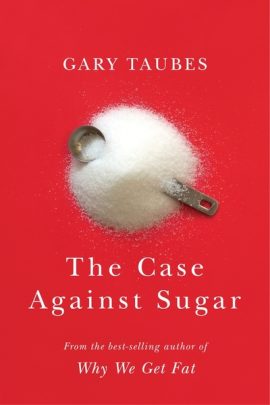The case against sugar: Do you agree?

This is not just another ‘diet’ book; it is an intelligent, statistics-backed exposé on the perils of eating sugar.
In fact, investigative journalist Gary Taubes in this his third book The Case Against Sugar has taken on the role of judge and jury as he closely examines and then exposes the consequences of the over consumption of a tiny white grain which some have said is more addictive than cocaine. It is sugar which is in the headlights of this global exposition, and Gary Taubes is just the man to tell it.
In the author’s note Taubes states that: the purpose of this book is to present the case against sugar, both sucrose and high-fructose corn syrup, as the principal cause the chronic diseases that are most likely to kill us, or at least accelerate our demise. If this were a criminal case, The case against Sugar would be the argument for the prosecution.

Diabetes is the first chronic disease to be examined. Taubes goes into an extremely well-researched history of the first documented cases of diabetes when urine was noted as smelling sweet in the sufferer. The rapid rise of diabetes along with the associated obesity is due to what people eat. High fat, nutrient poor, processed pseudo-foods which are saturated in sugar are the main culprits. I had not been previously aware that even tobacco contains this deadly substance. How is this even legal?
Is sugar a drug or a food? Witness the bliss on a baby’s face as it takes its first taste of this sweet substance. Taubes asserts that this early association and exposure to sugar sets up the earliest memories of pleasure and happiness with small children. What parent has not given a child a sweet treat to keep them quiet or as an instant reward? What begins as a sweet servant becomes a malevolent mistress as children over exposed to sugar become hyperactive, obese, have higher incidences of dental caries and the markers for future adult onset chronic disease.
Taubes examines the first ten thousand years of sugar consumption; initially available only to our early ancestors in the occasional wild fruits they would find as hunters and gatherers. As the centuries moved forward, sugar cane was discovered, and with its history rooted in slavery, sugar slowly became more available to, initially, the wealthy, and, finally, the working class.
Consumption has escalated. Nearly every manufactured food substance has sugar hidden in some form – from tomato sauce, savoury crackers and baby formula to toothpaste. How can the consumer win with the cards stacked against them?
And who stacks the cards? The manufacturers and ‘Big Food’, those giants of industry who manipulate the already addicted taste buds of every citizen on this planet. If a customer is even looking for a healthier, sugar-free alternative, then ‘Big Food’ will just add it in with a different name. And the average consumer is no wiser.
Taubes ‘outs’ the big offenders. From the Governmental departments that have vested interests in ‘Big Food’ to some of the stalwart defenders of public health who have tried to bring this horror to light. But if the Government purse has it’s coffers lined with the profits from the main offenders, then what can the average citizen do. Our average General Practitioner is trained mainly in the use of medical intervention to cure disease, and much of this intervention is pill based and ‘Big Pharma’ backed. Very few doctors have had training in good food and nutrition guidelines, and with a faulty food pyramid being the standard to adhere to, what hope do families have?
In his epilogue, Taubes considers how much sugar is too much. This is sobering reading. This book is extremely well researched. The depth of examination has produced a very uncomfortable, confronting read for the average consumer. Every parent and grandparent needs to read this book.
The Case Against Sugar is heavy going at times, the research and numbers and statistics mind boggling but still essential to understand the global magnitude of this problem. Gary Taubes would certainly win if he was in front of a judge and jury in court. Our role, as the jury, is to take what this book shows and use it in our own lives, and in the lives of our families. It is only we as Joe Citizen who can have the final say, and be the executioner in this case, by voting with our purses and more informed food choices.
The Case Against Sugar by Gary Taubes is available from Dymocks. Click here to learn more.








 Proudly Australian owned and operated
Proudly Australian owned and operated